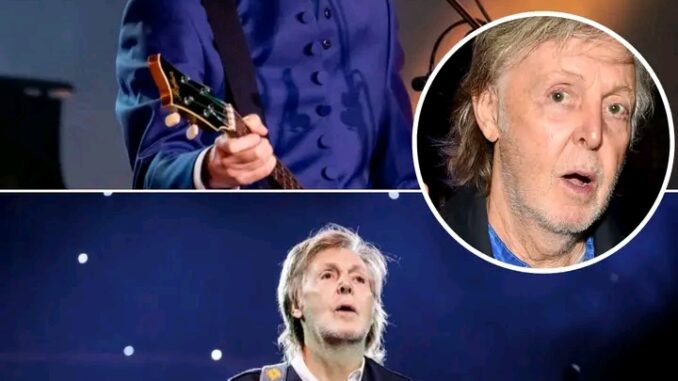
In a bold and unprecedented move, Paul McCartney, the legendary Beatles musician, has released a song that is entirely silent. At 83 years old, McCartney continues to push creative boundaries, but this latest project is more than just a musical experiment; it’s a powerful statement on the future of music and artificial intelligence. The track, which features absolutely no sound, has already made waves across the industry, critics, fans, and even government officials alike, sparking a global conversation about AI’s role in music creation and intellectual property rights.
The silent song, officially titled “The Sound of Silence,” is a conceptual piece that challenges listeners to reflect on what music truly is. While it contains no audible notes, its message is deafening. McCartney, known for his lyrical mastery and innovative spirit, explained that the track is a protest against the potential legalization of “music theft” facilitated by AI technology. He warns that if lawmakers proceed with legislation that permits AI to generate and distribute music without proper licensing or compensation, it could undermine the livelihoods of countless artists and fundamentally alter the creative landscape.
McCartney’s stance resonates strongly within an industry increasingly threatened by AI-driven music production. With tools capable of replicating artists’ voices, styles, and compositions, concerns about copyright infringement and the devaluation of human artistry have become more urgent. The silent song serves as a symbolic reminder that music is more than just sound; it’s an emotional, cultural, and personal expression that must be protected from commodification and theft.
The protest has garnered widespread support from over 1,000 artists across various genres, all voicing their opposition to the proposed AI legislation. These artists argue that the current trajectory of AI in music risks eroding the integrity of creative work, threatening to turn musical expression into an indistinguishable, soulless product. Many musicians have expressed fears that AI could lead to widespread job losses and the dilution of authentic artistic voices, making it easier for corporations to mass-produce music without fair compensation.
McCartney’s final message, delivered through this silent track and a series of public statements, is a call to action for policymakers. He urges the UK government and other regulatory bodies worldwide to carefully consider the implications of legalizing AI-generated music without safeguards. “Music is the voice of the human soul,” McCartney stated in a recent interview. “We cannot allow machines to steal that voice and pass it off as their own. Legislation must protect artists and preserve the integrity of our art form.”
The reaction from the public has been mixed. While many are inspired by McCartney’s bold stance, others question whether a silent song can truly convey such a powerful message. Nonetheless, the track’s viral spread on social media platforms has amplified its impact, making it a symbol of resistance against the encroachment of AI into the realm of human creativity.
Industry experts are divided in their opinions. Some believe that AI has the potential to augment and innovate musical creation, opening new avenues for artists. Others warn that without strict regulations, AI could become a tool for exploitation rather than empowerment. The silent song underscores the urgent need for balanced policies that foster technological advancement while safeguarding artists’ rights.
As the debate intensifies, McCartney’s protest highlights a broader cultural concern: the preservation of human artistry in an increasingly digital world. His silent track is a stark reminder that music’s essence lies beyond sound — it’s rooted in emotion, experience, and the human condition. The message is clear: the industry must find a way to integrate AI responsibly, ensuring that technology serves as a tool to enhance, not replace, the unique voice of human musicians.
In conclusion, Paul McCartney’s release of a silent song as a form of protest marks a pivotal moment in the ongoing conversation about AI and music. It exemplifies how art can be used as a powerful platform for advocacy, inspiring over a thousand artists and engaging policymakers in urgent discussions about rights, innovation, and the future of creative expression. As the UK government and global authorities deliberate, the world watches closely, reminded that even in silence, music’s message can be deafening.
Leave a Reply